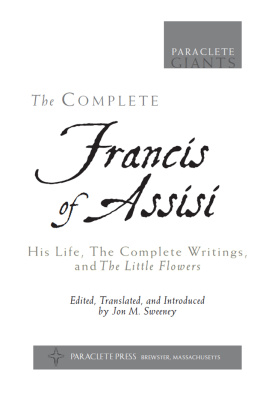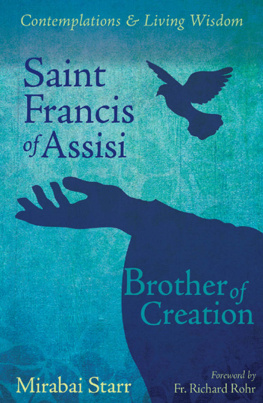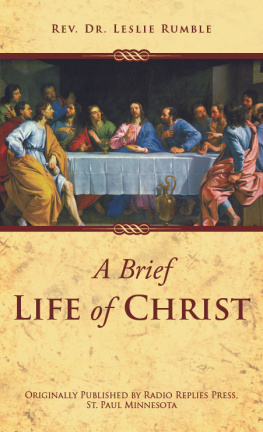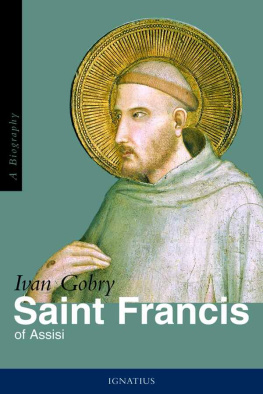Candide Chalippe - The Life and Legends of Saint Francis of Assisi
Here you can read online Candide Chalippe - The Life and Legends of Saint Francis of Assisi full text of the book (entire story) in english for free. Download pdf and epub, get meaning, cover and reviews about this ebook. year: 0, genre: Detective and thriller. Description of the work, (preface) as well as reviews are available. Best literature library LitArk.com created for fans of good reading and offers a wide selection of genres:
Romance novel
Science fiction
Adventure
Detective
Science
History
Home and family
Prose
Art
Politics
Computer
Non-fiction
Religion
Business
Children
Humor
Choose a favorite category and find really read worthwhile books. Enjoy immersion in the world of imagination, feel the emotions of the characters or learn something new for yourself, make an fascinating discovery.
- Book:The Life and Legends of Saint Francis of Assisi
- Author:
- Genre:
- Year:0
- Rating:5 / 5
- Favourites:Add to favourites
- Your mark:
- 100
- 1
- 2
- 3
- 4
- 5
The Life and Legends of Saint Francis of Assisi: summary, description and annotation
We offer to read an annotation, description, summary or preface (depends on what the author of the book "The Life and Legends of Saint Francis of Assisi" wrote himself). If you haven't found the necessary information about the book — write in the comments, we will try to find it.
The Life and Legends of Saint Francis of Assisi — read online for free the complete book (whole text) full work
Below is the text of the book, divided by pages. System saving the place of the last page read, allows you to conveniently read the book "The Life and Legends of Saint Francis of Assisi" online for free, without having to search again every time where you left off. Put a bookmark, and you can go to the page where you finished reading at any time.
Font size:
Interval:
Bookmark:
INTRODUCTORY NOTE
The Life and Legends of St. Francis of Assisi by Father Candide Chalippe, O.F.M., need no apology. The work was first published at Paris in 1727. It is not only well written and reliable withal, but also instructive, elevating and inspiring. The facts and legends mentioned are drawn from the oldest and most reliable sources. The abundance of incidents and anecdotes not to be found elsewhere make the volume eminently interesting, while the reflexions and applications which the author now and then interweaves with the narrative are so replete with practical hints on spiritual life, that they will undoubtedly produce the best spiritual results in the reader. The style though simple, at times graphic, is very pleasing; the narrative flows on with equal ease and freedom.
In 1852 a priest from the Oratory of St. Philip Neri made a translation into English from what was then the latest French edition. This French edition came from the press in 1850. With the English translation the original work appeared in an abridged form. The original work is divided into six books, the English translation contains but half of these, so rearranged for the sake of clearness that they form five books. Most elucidations of the original work regarding characteristics of St. Francis, events and dates that are doubtful, are omitted, likewise most of the writings of St. Francis. The former were and still are undergoing changes, owing to new historical researches and discoveries made by students of Franciscan sources, while the latter were but lately again newly translated into English and edited as completely as possible with many critical notes and references of great value by the scholarly Father Paschal Robinson, O.F.M.The Writings of St. Francis of Assisi by Father Paschal Robinson, O.F.M. The Dolphin Press, 1906.
The marvellous progress the Third Order of St. Francis is making in this country causes the story of the life of St. Francis that is herewith presented to the public in a newly revised edition to be especially welcome. For all Tertiaries know that mere devotion to St. Francis is of itself not sufficient to acquire the spirit of their Seraphic Father; all are aware that membership in the Third Order does not necessarily argue the possession of this spiritand yet, every real Tertiary desires nothing more than to acquire the poor, humble, loving spirit of St. Francis. This spirit can scarcely be acquired, unless the life of St. Francis be well known, meditated upon and imitated as far as practicable. The Life and Legends of St. Francis of Assisi by Father Candide Chalippe, O.F.M., is peculiarly adapted to help Tertiaries to perform this task; the spirit of St. Francis breathes in every page. Not once, but several times may Tertiaries read this book to great advantage. With every reading new items of interest will be discovered, new lessons will present themselves to be learnt, new inspirations will be imparted to the soul from above. The more this book is read, the more it will be loved; the more it is studied, the more it will be admired. For Tertiaries a book of this kind is a necessity; it is as necessary for them as a text-book is for a scholar.
May this wonderful work spread in the future even more rapidly than before, may it receive the hearty welcome it deserves among the innumerable Tertiaries and clients of St. Francis of Assisi and be to them a sure guide to God's abundant graces in this world and to life everlasting in the next.
PREFACE BY THE AUTHOR
WHEREIN THE PREJUDICES OF CERTAIN PERSONS AGAINST MIRACLES WHICH ARE RECORDED IN THE LIVES OF THE SAINTS ARE SHOWN TO BE BOTH UNREASONABLE AND DANGEROUS, AND THAT THE MIRACLES ATTRIBUTED TO SAINT FRANCIS ARE VERY WELL AUTHENTICATED.
A very common failing amongst men is to adopt one extreme in the endeavor to avoid another, and sometimes not to perceive that the extreme into which they fall is greater than that which they had sought to flee from. To insure themselves against weak incredulity, some have imbibed such prejudice against the miracles in the Lives of the Saints, that they cannot endure to hear of them; the very ideas of miracles, revelations, ecstasies, visions, apparitions, are hateful and disgusting to them; all that is said on these subjects they look upon as fabulous and incredible; they call in question the most undeniable evidence, or attribute these wonders to natural and unknown causes. The wonders which are recorded in the Life of St, Francis, afford an opportunity of grappling with these prejudices.
In the first place, no man using his right reason will reject the wonders recorded in the Lives of the Saints, because of their impossibility. Miracles are extraordinary events, which break through the laws of nature, and exceed the force of all natural causes; it is only necessary to make use of our reason to be aware that God, whose power is infinite, having freely established these laws, may, whenever He thinks fit, break through them Himself by the ministry of His creatures, whom He makes use of as He pleases; that these suspensions may enter into the external designs of His wisdom and providence, and that they occur by successive acts, without there having been any change in Him, because it is an act of His will which causes them, as it does every other thing. Now this proves that miracles are possible, and that there is no impossibility in the wonders recorded in the Lives of the Saints.
In the second place, these wonders ought not to cause an incredulous surprise in any sensible person who pays due attention to the wonders of nature. "Man," says St. Augustine, "sees extraordinary things happen, and he admires them, while he himself, the admirer, is a great wonder, and a much greater miracle than any things which are done by the intervention of man. There is nothing more marvellous done in the world, which is not less wonderful than the world itself. All nature is full of what is miraculous; we seem unconscious of it, because we see those things daily, and because this daily repetition lowers them in our eyes. And this is one reason why God has reserved to Himself other things out of the common course of nature, on which He shows His power from time to time, in order that their novelty may strike us; but when we consider attentively, and with reflection, the miracles we constantly see, we find that they are far greater than others, however surprising and uncommon these may be."
The holy doctor admits that the prodigies which are out of the common course of nature, and which are properly called miracles, are to be viewed with astonishment, since they are works of God, worthy of admiration; he only requires that the surprise they cause shall be qualified by a consideration of the wonders of nature, to which he likewise gives the name of miracles, in a more extended sense: on the same principle, and a fortiori , what there is surprising in them should not make them appear to us incredible. An enlightened mind does not believe in miracles which are communicated to him, unless due proof of them is adduced; but it is not because what is wonderful in them renders him incredulous, because he sees more marvellous things in the universe and in himself. If men who apply themselves to the study of nature, are pertinacious in refusing to believe in the miracles of the saints, it is because they do not make use of the light they have received, and do not reason deductively; they have only sought to gratify their curiosity, or to gain credit for their discoveries; and do not some of them lose themselves in their speculations, and become impious, even so as to recognize no other God than nature itself?
In the third place, faith in the great mysteries of religion must incline us to believe in the wonders we read in the Lives of the Saints. Are we, then, not called upon to say to those whose prejudices we oppose: "As you belong to the society of the faithful, you not only believe that three Persons make only one God; that the Son of God was made man; that the dead shall rise again; but also, that Jesus Christ becomes every day present on our altars, under the species of bread and wine, at the words of consecration; and you believe all the other astonishing wonders that are proposed to you in our holy religion: why, then, do you find such repugnance in believing those of the Lives of the Saints, which are far inferior to the former"?
Next pageFont size:
Interval:
Bookmark:
Similar books «The Life and Legends of Saint Francis of Assisi»
Look at similar books to The Life and Legends of Saint Francis of Assisi. We have selected literature similar in name and meaning in the hope of providing readers with more options to find new, interesting, not yet read works.
Discussion, reviews of the book The Life and Legends of Saint Francis of Assisi and just readers' own opinions. Leave your comments, write what you think about the work, its meaning or the main characters. Specify what exactly you liked and what you didn't like, and why you think so.











